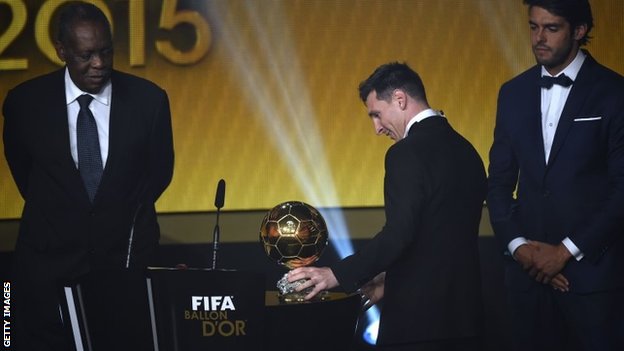
Barcelona forward Lionel Messi has won the Ballon d’Or award for the world’s best player for the fifth time.
The 28-year-old Argentine had 41.33% of the vote, with Real Madrid forward Cristiano Ronaldo (27.76%) second and Barca’s Neymar (7.86%) third.
Either Messi or Ronaldo, who became a three-time winner last year, have won the past eight awards.
United States midfielder Carli Lloyd, who scored a hat-trick in the World Cup final, won the women’s award.
England coach Mark Sampson was beaten to the women’s football coach of the year award by USA boss Jill Ellis, who was born in Portsmouth.
Messi’s 2015 in numbers
- 61 games, 52 goals and 26 assists.
- A goal every 101 minutes and an assist every 202 minutes.
- Best minutes-per-goal rate – 80 – of anyone scoring a minimum of 10 goals across Europe’s top five leagues during 2015.
- Directly involved in 49 goals in La Liga – 34 scored and 15 assists – which was the joint-most with Ronaldo in 2015 across the top five European leagues.
- Scored in all six club tournaments in 2015, as Barcelona won five of them.
| Past Ballon d’Or winners | |
|---|---|
| 2014: Cristiano Ronaldo | 2008: Cristiano Ronaldo |
| 2013: Cristiano Ronaldo | 2007: Kaka |
| 2012: Lionel Messi | 2006: Fabio Cannavaro |
| 2011: Lionel Messi | 2005: Ronaldinho |
| 2010: Lionel Messi | 2004: Andriy Shevchenko |
| 2009: Lionel Messi | 2003: Pavel Nedved |
Ballon d’Or – world player of the year
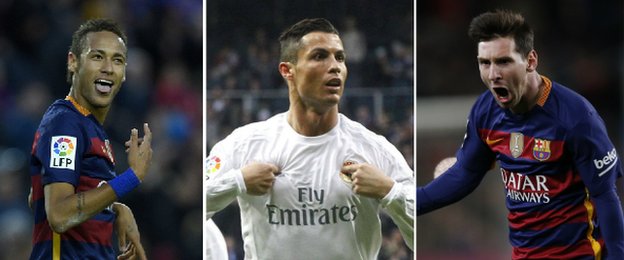
Neymar (left), Ronaldo (centre) and Messi all play in Spain’s La Liga
Lionel Messi extended his record haul of world player of the year awards with his fifth after winning the treble – La Liga, the Copa del Rey and the Champions League – with Barcelona in 2014-15.
Portugal captain Ronaldo, 30, scored 57 goals in as many games in 2015 – including a record 16 in the Champions League – but that was not enough to win him Ballon d’Or number four.
Barcelona striker Neymar, 23, was the first Brazilian to finish in the top three since Kaka won the 2007 award.
He scored 45 goals in 62 games and is joint top scorer in this season’s La Liga with 15, level with team-mate Luis Suarez.
“It’s a very special moment for me to be back here on this stage, winning again another Ballon d’Or after seeing Cristiano win it,” Messi said.
“It’s incredible that it’s my fifth, much more than anything I would have dreamed of as a kid.”
Women’s world player of the year
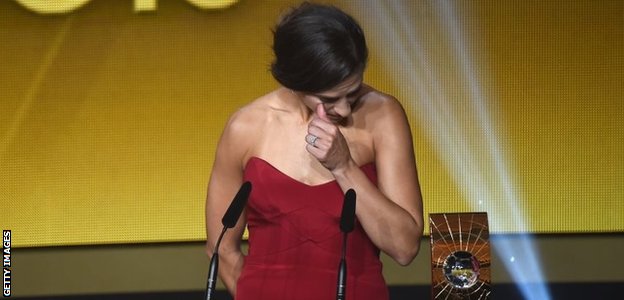
Carli Lloyd was emotional when accepting the award
USA’s World Cup-winning midfielder Carli Lloyd, 33, won the women’s world player of the year award.
She scored a hat-trick in the final against Japan, including a sensational strike from the halfway line, and earned the Golden Ball for best player in the tournament.
Former Germany striker Celia Sasic finished second despite retiring halfway through 2015 at the age of 27.
She was top scorer in the World Cup with six goals and won the Champions League with Frankfurt.
Japan midfielder Aya Miyama, 30, captained her country to the World Cup final, where they lost to the USA. She was third.
None of the shortlisted trio had won the award before.
Lloyd said: “It has been a dream ever since I started with the national team. Keep your dreams and just go after them.”
Fifa/Fifpro World XI
Real Madrid had as many players as Barcelona – four – in the world team of the year despite not winning a trophy.
Bayern Munich goalkeeper Manuel Neuer was the Bundesliga’s only representative, while Juventus midfielder Paul Pogba and Paris St-Germain’s Thiago Silva represented Serie A and Ligue 1 respectively.
The Premier League was the only one of Europe’s top five leagues not to have anyone in the team.
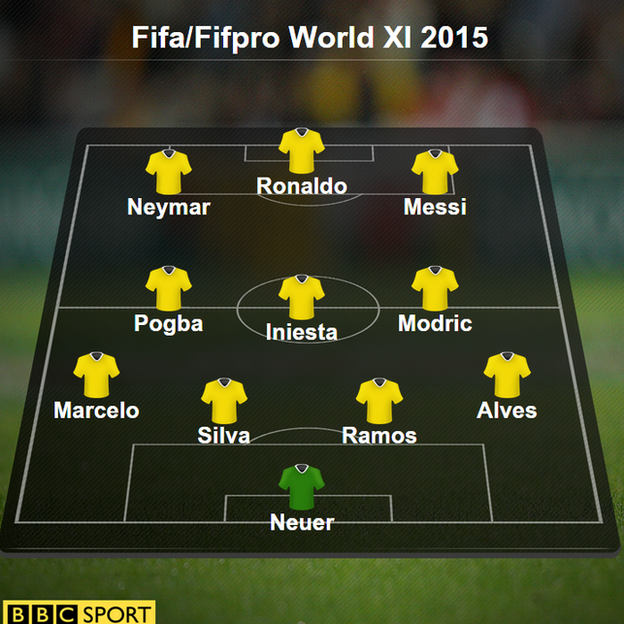
The team of the year is voted for by professional footballers worldwide
World coach of the year – men’s football
Barcelona coach Luis Enrique won the world coach of the year award after leading his side to five of the six trophies on offer in 2015, including the Champions League, La Liga and the Copa del Rey.
He beat Bayern Munich boss Pep Guardiola, who was second, and Chile’s Copa America-winning coach Jorge Sampaoli to the award.
World coach of the year – women’s football
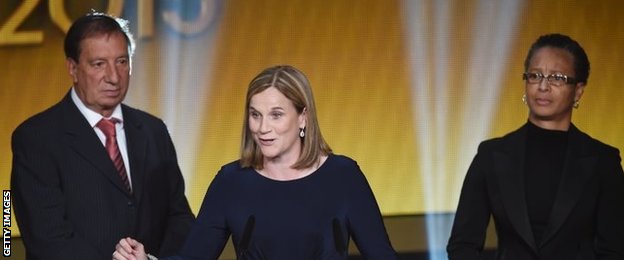
Ellis has been USA head coach since May 2014 after several different jobs in the United States set-up
United States coach Jill Ellis was named women’s football world coach of the year after leading her country to World Cup glory in the summer.
England coach Mark Sampson finished third with 10.68% of the vote after their third-place finish in Canada. Second was Japan coach Norio Sasaki, whose side beat England in the semi-finals, but lost to USA in the final.
“It is a true honour,” said 49-year-old Ellis, who moved to the US in 1981. “To Fifa, to our own federation, thank you for your belief, your vision and your investment in women’s football.”
Puskas award – goal of the year
Atletico Goianiense’s Wendell Lira won the goal of the year award for his overhead kick against Goianesia in Brazil’s Goiano state league.
Messi’s run from halfway and finish in the Copa del Rey final against Athletic Bilbao was second, with Roma full-back Alessandro Florenzi’s 55-yard goal against Barca third.
Fair play award
Former Leeds and South Africa captain Lucas Radebe announced the winner of this year’s fair play award.
That went to every football club and organisation supporting refugees.
How does voting work?
Journalists, national team coaches and captains vote for their top three in all categories, apart from the Puskas and fair play ones.
They select their first, second and third choice for each award, with five, three and one points given to each place respectively.
The winner is the person with the most points. In the event of a tie, it goes to the player or coach with the most first places.
The Puskas award, for the “most beautiful goal” of 2015, is voted for by users of the Fifa and France Football websites.

